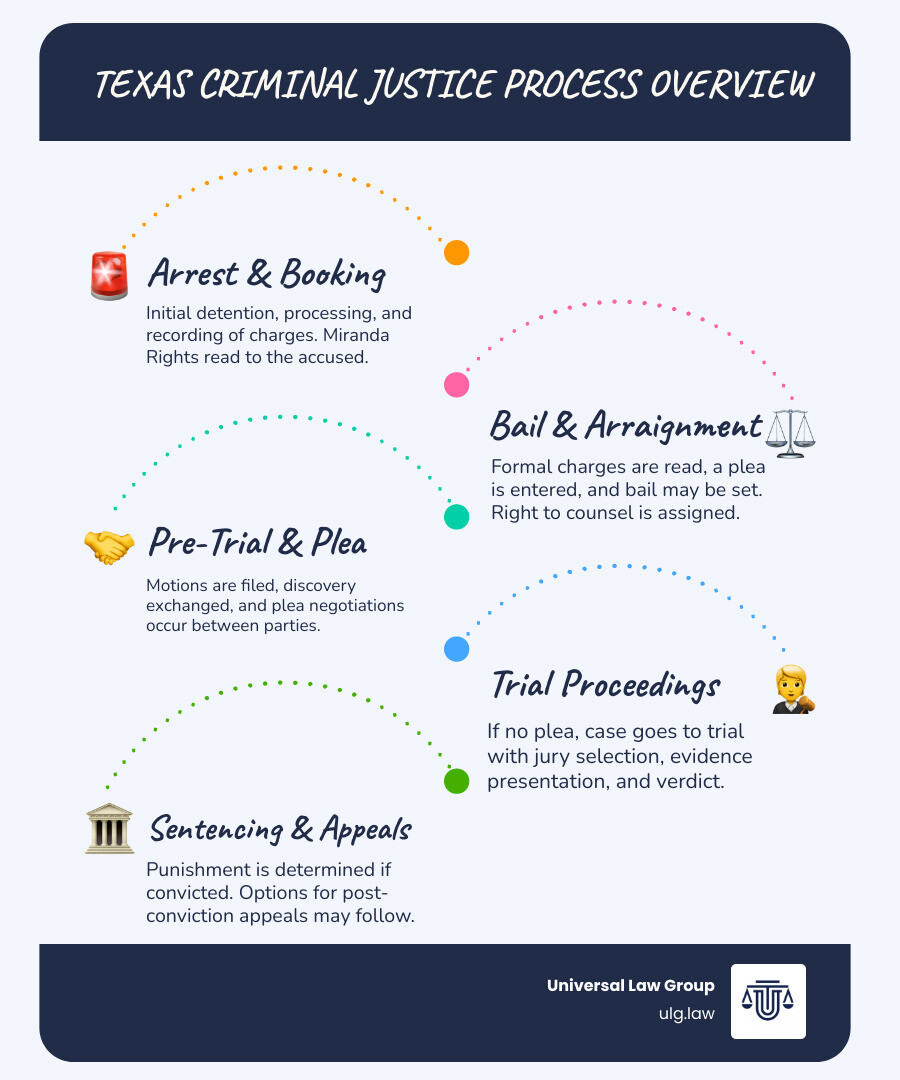The Ultimate Guide to Texas Criminal Law
Why Understanding Criminal Law Texas Matters for Your Future
Texas Criminal Law governs how the state prosecutes and punishes crimes, from minor misdemeanors to capital felonies. If you’re facing charges, understanding the system is the first step toward protecting your future.
Quick Overview of Criminal Law in Texas:
- Misdemeanors: Punishable by fines and up to one year in county jail.
- Felonies: Punishable by fines and state prison time, from 180 days to life or the death penalty.
- Your Rights: Include the right to remain silent, the right to an attorney, and protection from unreasonable searches.
- Key Principle: Conduct is only an offense if defined by statute, and penalties increase for repeat offenders.
The reality is sobering. In 2022, Texas law enforcement agencies reported 1,113,171 crimes. State courts processed over 73,900 felony cases and 174,500 misdemeanor cases. These aren’t just statistics; they represent lives fundamentally altered by the criminal justice system.
Criminal Law in Texas is built on the Texas Penal Code, a comprehensive framework that defines illegal actions, establishes criminal responsibility, and sets punishment ranges. A conviction can lead to imprisonment, substantial fines, loss of voting rights, and permanent damage to your reputation and employment prospects. Navigating this complex system without experienced legal guidance is a significant risk.
I’m Brian Nguyen, co-founder and Managing Partner of Universal Law Group, where I lead our criminal defense division. My career began as an Assistant District Attorney, giving me invaluable insight into prosecutorial strategies—knowledge I now use exclusively to defend our clients.

Foundations of the Texas Penal Code
The Texas Penal Code is the rulebook for Texas Criminal Law, defining what is illegal and what happens when someone breaks those rules. Organized into 12 distinct titles, it covers everything from general principles and offenses against persons to white-collar crime and terrorism. This comprehensive code is the foundation upon which all criminal prosecutions are built.
A core principle of Texas law is that conduct is only criminal if a statute explicitly says so. This “fair warning principle” protects citizens from arbitrary enforcement, ensuring you have the right to know what is illegal before you act. Prosecutors cannot invent crimes; the offense must be clearly defined in the law. We frequently reference the official 2024 Texas Statutes :: Penal Code to build defenses on the most current legal framework.
Primary Objectives and Scope
The Texas Penal Code was designed with several key objectives that guide the entire criminal justice system:
- Ensure Public Safety: The primary goal is to protect Texans through deterrence, rehabilitation, and punishment that fits the crime.
- Provide Fair Warning: The code clearly defines prohibited conduct so that ordinary people can understand and follow the law.
- Establish Proportionate Penalties: It creates a tiered system of punishments, from minor fines to life imprisonment, ensuring consequences reflect the severity of the offense.
- Safeguard Innocent Conduct: By requiring criminal intent (culpability) and providing for various defenses, the code protects individuals from being punished for accidents or morally blameless actions.
- Guide Official Discretion: It provides guardrails for law enforcement, prosecutors, and judges to prevent arbitrary or biased treatment.
- Define State Jurisdiction: The code specifies when Texas courts have the authority to prosecute an offense, which is crucial in cases involving conduct across state lines.
Defining Offenses and Jurisdiction in Texas
In Texas, an act is only an offense if it is defined as such by a state statute, municipal ordinance, or other lawfully adopted rule. A prosecutor cannot charge you unless your conduct is explicitly prohibited in written law.
Texas also has specific territorial jurisdiction rules. Generally, Texas can prosecute a crime if the conduct or the result of the conduct occurred within the state. For example, if a person in another state causes harm to someone in Texas, our courts have jurisdiction. This authority extends to attempts, conspiracies, and solicitations planned outside the state but intended to be carried out in Texas. These rules prevent individuals from evading justice by crossing state lines. The Attorney General also has concurrent jurisdiction with local prosecutors for crimes involving state property, ensuring these offenses are addressed.
Offense Classifications and Punishments in Texas

One of the first questions clients ask is, “What am I looking at?” The answer lies in how Texas Criminal Law classifies offenses. The distinction between a misdemeanor and a felony determines whether you face a small fine or years in prison, a temporary setback or a permanent mark on your record. In 2022, Texas courts handled over 73,900 felony cases and 174,500 misdemeanor cases, underscoring how seriously the state treats all criminal charges.
Understanding where your charge falls within this system is essential for your defense. The Texas Penal Code establishes specific punishment ranges for each classification, from minor fines to the death penalty.
| Offense Classification | Maximum Fine | Maximum Jail/Prison Time | Common Examples (Texas) |
|---|---|---|---|
| Class C Misdemeanor | $500 | None | Public Intoxication, Theft of property less than $100, Disorderly Conduct, Minor Traffic Violations |
| Class B Misdemeanor | $2,000 | 180 days (county jail) | DWI (1st offense), Theft of property $100-$750, Marijuana possession (up to 2 oz), Criminal Trespass |
| Class A Misdemeanor | $4,000 | 1 year (county jail) | Assault causing bodily injury, Theft of property $750-$2,500, DWI (2nd offense), Marijuana possession (2-4 oz) |
| State Jail Felony | $10,000 | 180 days – 2 years | Theft of property $2,500-$30,000, Burglary of a Building, Forgery, Marijuana possession (4 oz – 5 lbs) |
| Third-Degree Felony | $10,000 | 2 – 10 years | Theft of property $30,000-$150,000, DWI (3rd offense), Aggravated Assault, Robbery, Marijuana possession (5-50 lbs) |
| Second-Degree Felony | $10,000 | 2 – 20 years | Aggravated Assault with deadly weapon, Sexual Assault, Arson, Kidnapping, Theft of property $150,000-$300,000 |
| First-Degree Felony | $10,000 | 5 – 99 years or life | Murder, Aggravated Robbery, Aggravated Kidnapping, Sexual Assault of a Child, Theft of property $300,000+ |
| Capital Felony | None | Life without parole or death penalty | Capital Murder (e.g., murder of a police officer, multiple murders) |
Understanding Misdemeanors: From Fines to Jail Time
Even a minor misdemeanor conviction can create future obstacles. Class C misdemeanors are the lowest level, punishable by a fine up to $500 with no jail time. Common examples include public intoxication or minor theft. While there’s no jail, a conviction creates a criminal record.
Class B misdemeanors are more serious, carrying up to 180 days in county jail and a $2,000 fine. A first-offense DWI, theft of property under $750, or possession of up to two ounces of marijuana fall into this category. Class A misdemeanors are the most serious, with penalties up to one year in jail and a $4,000 fine. Examples include assault causing bodily injury or a second DWI.
A Deep Dive into Texas Felonies and Their Consequences
Felony convictions carry severe, life-altering consequences, including state prison time and the loss of civil rights. State jail felonies are the lowest level, with a sentence of 180 days to two years in a state jail facility. Third-degree felonies carry a prison term of two to ten years. Second-degree felonies increase the punishment to two to 20 years in prison. First-degree felonies carry a sentence of five to 99 years or life imprisonment. Finally, capital felonies, such as capital murder, are punishable by life without parole or the death penalty.
Improved Penalties for Repeat and Habitual Offenders
Texas law includes provisions that significantly increase punishments for repeat offenders. If you are convicted of a felony and have two prior felony convictions, you could face a sentence of 25 to 99 years or life in prison. Even one prior felony conviction can improve a new first-degree felony charge to a minimum of 15 years. State jail felonies can be improved to third-degree felonies if a deadly weapon was used or if the defendant has a prior felony conviction. This is why your criminal history is a critical factor in any new case, as it can dramatically alter the potential consequences.
Key Concepts in Criminal Law Texas

Criminal Law Texas operates on foundational principles that are critical to every case. Understanding these concepts is essential for navigating the system and building a strong defense. At Universal Law Group, we use our deep knowledge of these principles, supported by resources like the Texas Penal Code legal resource, to protect our clients’ rights.
Principles of Criminal Responsibility and Culpability
In Texas, a conviction requires the state to prove two elements beyond a reasonable doubt: the actus reus (the criminal act) and the mens rea (the guilty mental state). The burden of proof always rests with the prosecution. The Texas Penal Code defines four levels of culpable mental states:
- Intentionally: The person has a conscious desire to engage in the conduct or cause the result.
- Knowingly: The person is aware their conduct is reasonably certain to cause the result.
- Recklessly: The person is aware of a substantial and unjustifiable risk but consciously disregards it.
- Criminally Negligent: The person ought to have been aware of a substantial and unjustifiable risk but fails to perceive it.
The required level of culpability is a critical element of any offense. If the state cannot prove the required mental state, the defendant should be acquitted. This is often a key area for a successful defense.
Understanding Inchoate (Preparatory) Offenses
Texas law allows for the prosecution of inchoate offenses—crimes that are not completed. This allows law enforcement to intervene before more serious harm occurs.
- Criminal Attempt: Occurs when a person takes a “substantial step” beyond mere preparation toward committing an offense.
- Criminal Conspiracy: An agreement between two or more people to commit a felony, combined with an overt act by one of them to further the agreement.
- Criminal Solicitation: Asking, commanding, or attempting to induce another person to commit a capital or first-degree felony.
Punishment for an inchoate offense is generally one category lower than the target offense. For example, an attempt to commit a first-degree felony is typically punished as a second-degree felony.
Critical Definitions in Texas Criminal Law
Precise legal definitions can determine the outcome of a case. Here are a few critical terms:
- Bodily Injury: Broadly defined as physical pain, illness, or any impairment of physical condition. The presence of bodily injury can lift a simple assault to a more serious charge.
- Serious Bodily Injury: An injury that creates a substantial risk of death or causes death, serious permanent disfigurement, or protracted loss or impairment of a bodily member or organ. This can lift an assault to an aggravated assault, a felony.
- Deadly Weapon: A firearm or anything “manifestly designed, made, or adapted” to inflict death or serious bodily injury. Critically, it also includes any object that, in the manner of its use, is capable of causing death or serious bodily injury. A car, a boot, or a rock can be a deadly weapon, which can dramatically increase the severity of a charge.
- Effective Consent: Consent given freely and knowingly, without being induced by force, threat, or fraud. If consent is not effective, the conduct may be criminal.
Common Criminal Offenses in Texas
The Texas Penal Code organizes Texas Criminal Law into categories based on the type of harm caused. In 2022, Texas recorded 178,909 violent crimes and 934,262 property crimes, representing real people facing serious allegations. Understanding these common offenses is the first step in building a defense.
Offenses Against the Person: Assault, Homicide, and More
Title 5 of the Penal Code covers crimes that harm or threaten a person’s physical safety. These charges carry some of the most severe penalties.
- Assault: Can range from causing bodily injury to making a threat of imminent harm or even causing offensive physical contact. When it involves serious bodily injury or a deadly weapon, it becomes Aggravated Assault, a serious felony.
- Criminal Homicide: Includes Murder, Capital Murder, Manslaughter, and Criminally Negligent Homicide. Capital Murder, the most serious, is punishable by life without parole or death.
- Kidnapping and Unlawful Restraint: Involve restricting a person’s movement without their consent. Kidnapping is a felony, while unlawful restraint can be a misdemeanor.
- Sexual Offenses: This category includes Sexual Assault, Continuous Sexual Abuse of a Child, and Indecency with a Child. Convictions carry lengthy prison sentences and mandatory lifetime sex offender registration.
Offenses Against Property: Theft, Burglary, and Fraud
Title 7 addresses crimes involving property. While often viewed as less severe than violent crimes, they can still result in life-altering felony convictions.
- Theft: Unlawfully taking property with the intent to deprive the owner of it. The penalty is based on the value of the stolen property, ranging from a Class C misdemeanor (under $100) to a first-degree felony ($300,000 or more).
- Burglary: Entering a building or habitation without consent with the intent to commit a felony, theft, or assault. The crime is complete upon entry with intent. Burglary of a habitation (a home) is a more serious felony than burglary of a building.
- Robbery: Committing theft while also causing or threatening bodily injury. The element of violence or threat lifts theft to robbery.
- Arson and Criminal Mischief: Involve damaging property. Arson, especially of a home, is a serious felony due to the risk to human life. Criminal mischief penalties are based on the value of the damage.
- Fraud: Includes a wide range of deceptive acts like credit card abuse or insurance fraud. Penalties often depend on the financial loss involved.
Offenses Against Public Administration
Title 8 covers crimes that undermine the integrity of government functions. Prosecutors pursue these cases aggressively.
- Bribery: Offering or accepting a benefit to influence an official action.
- Perjury: Lying under oath or making false statements to authorities.
- Obstructing Governmental Operation: Includes Resisting Arrest (using force to prevent an arrest) and Evading Arrest (fleeing from police). Evading in a vehicle is a felony.
- Abuse of Office: A public servant misusing their position for personal gain or to harm others.
- Tampering with a Witness: Intentionally trying to prevent someone from testifying or providing information in an investigation.

When you’re facing criminal charges, the system can feel overwhelming. However, understanding your rights and the legal process can empower you. At Universal Law Group, our experience as former prosecutors gives us unique insight into how the state builds its cases. We use that knowledge to craft proactive defense strategies that protect your rights from the very beginning.
Your Rights When Accused of a Crime in Texas
The U.S. and Texas Constitutions provide critical protections to level the playing field between an individual and the state.
- Fifth Amendment Right to Remain Silent: You are never obligated to answer questions from law enforcement. Anything you say can be used against you. The smartest move is to politely state, “I wish to remain silent and I want to speak with an attorney.”
- Sixth Amendment Right to an Attorney: You have the right to legal counsel during police interrogations and at all critical stages of the court process. If you cannot afford an attorney, one will be appointed for you.
- Fourth Amendment Protection from Unreasonable Searches and Seizures: Police generally need a warrant based on probable cause to search your property or arrest you. Evidence obtained in violation of this right may be suppressed and excluded from your case.
- Miranda Rights: Before a custodial interrogation, police must inform you of your right to remain silent and your right to an attorney. If they fail to do so, any statements you make may be inadmissible.
Exercising these rights is not an admission of guilt; it is a smart legal strategy. The moment you are questioned by law enforcement, you should clearly request a lawyer and stop talking.
The Criminal Justice Process: What to Expect
The path through the Texas criminal justice system follows several key stages:
- Arrest and Booking: You are taken into custody, and your information is recorded. This is a critical time to exercise your right to remain silent.
- Bail and Bond Hearing: A magistrate judge sets a bail amount to ensure your return to court. An attorney can argue for a reasonable bail.
- Arraignment: Your first formal court appearance where the charges are read and you enter a plea (usually “not guilty”).
- Pre-Trial Phase: This is where much of the legal work happens. Your attorney will review the state’s evidence (findy), file motions to suppress evidence, and challenge the prosecution’s case.
- Plea Bargaining: Many cases are resolved through negotiations between the defense and prosecution for a reduced charge or sentence. A strategic plea can be a favorable outcome, avoiding the risk of trial.
- Trial: If no plea agreement is reached, the case proceeds to trial. This involves jury selection, opening statements, presentation of evidence, cross-examination, and closing arguments. The state must prove guilt beyond a reasonable doubt.
- Sentencing: If you are convicted, the judge or jury determines your punishment within the legal range. Your attorney can present mitigating factors to argue for a more lenient sentence.
- Appeals: After a conviction, you have the right to appeal the decision to a higher court, arguing that legal errors occurred during the trial.
Frequently Asked Questions about Texas Criminal Law
Facing charges in Texas brings up many urgent questions. The system is complex, and the stakes are high. Here are straightforward answers to some of the most common concerns we hear from clients.
What is the difference between parole and probation in Texas?
Probation and parole both involve supervision but occur at different stages of the criminal justice process.
- Probation, officially called “community supervision,” is a sentence that is served instead of jail or prison time. A judge allows the individual to remain in the community under strict conditions, such as reporting to a probation officer, maintaining employment, and completing required programs. Violating these conditions can result in the revocation of probation and imposition of the original jail or prison sentence.
- Parole is an early, supervised release from prison. After serving a portion of their sentence, an inmate may be granted parole by the Texas Board of Pardons and Paroles. Like probation, parole comes with strict conditions that, if violated, can send the person back to prison to complete their sentence.
Can a felony charge be reduced to a misdemeanor in Texas?
Yes, it is often possible to get a felony charge reduced to a misdemeanor, though it is never guaranteed. This is a primary goal in many of our negotiations, as it can prevent the devastating long-term consequences of a felony conviction.
Reduction typically occurs through plea bargaining with the prosecutor. Key factors that influence a prosecutor’s decision include:
- The strength (or weakness) of the state’s evidence.
- The defendant’s criminal history.
- The specific facts and nature of the offense.
In some cases, pre-trial intervention programs or deferred adjudication can also provide a path to having charges reduced or dismissed upon successful completion of program requirements.
How long does a criminal case take in Texas?
The timeline for a criminal case varies significantly based on its complexity.
- Misdemeanor cases are generally faster, often resolving within a few months. However, if a case goes to trial, it can take six months or longer.
- Felony cases are much more complex and typically take several months to over a year to resolve. Serious felonies like murder can take even longer.
Factors influencing the timeline include the length of the police investigation, grand jury proceedings (for felonies), the court’s schedule, pre-trial motions filed by the defense, and whether the case is resolved by a plea agreement or proceeds to a full trial. While the wait can be frustrating, a thorough and strategic approach is always more important than a quick resolution.
Why You Need Expert Legal Guidance for Criminal Charges in Texas
If there’s one takeaway from this guide to Criminal Law in Texas, it’s that the system is complex, the stakes are incredibly high, and you should not face it alone. We’ve covered the intricate structure of the Texas Penal Code, the vast range of punishments, and the critical legal concepts that can make or break a case.
The 1,113,171 crimes reported in Texas in 2022 are not just numbers; they represent real people whose lives were changed by an encounter with the justice system.
A criminal conviction in Texas has consequences that last a lifetime. A felony can strip you of your right to vote and own firearms. Both felonies and misdemeanors can create permanent barriers to employment, housing, professional licenses, and educational opportunities. For non-citizens, a conviction can lead to deportation. Your future, freedom, and reputation are all on the line.
This is why experienced legal representation is a necessity, not a luxury. The system is designed to prosecute and punish. You need an advocate who knows the rules, the players, and the strategies for success. At Universal Law Group, our team includes former prosecutors who understand how the state builds its cases. We use this insider knowledge to construct the strongest possible defense for you.
The ULG Difference
Our legal team believes in treating you like a person, not a case number. We provide personalized, efficient, and responsive service, explaining your options in plain language and fighting for you at every turn. Our approach is proactive—we investigate your case, identify weaknesses in the prosecution’s evidence, and work to achieve the best possible outcome, whether through a favorable plea agreement or a battle at trial.
Your future deserves the protection that only experienced criminal defense attorneys can provide.
Don’t face the Texas criminal justice system alone. Contact our Houston criminal defense attorneys today for a consultation. Let us put our experience and our commitment to your future to work for you. The sooner we start building your defense, the better your chances of a favorable resolution.





